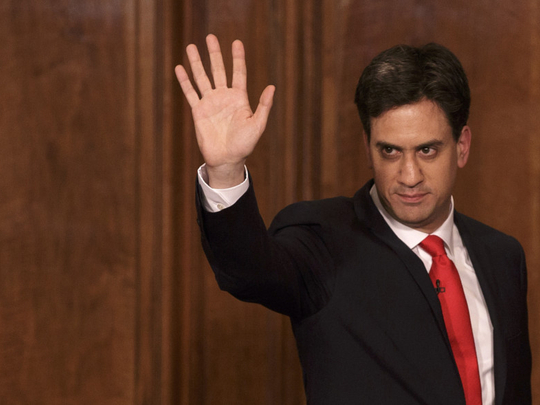
We cannot say we were not warned. David Cameron has lost no time since the election in turning his government sharply to the right. Under the banner of ‘blue collar Conservatism’, the Thatcherites and neocons have been let off the leash. New strike ballot voting thresholds of 40 per cent will make most industrial action illegal — this from a government backed by less than 25 per cent of the electorate. New restrictions on freedom of speech are being lined up in the name of British values. After a pre-election austerity pause, prepare for the most savage benefit and spending cuts yet — and what one Tory minister has promised will be a “flood of privatisation”.
But the Tories are not the only ones out to shift politics to the right. The Blairites have seized on Labour’s defeat to launch a bid to take back control of the party. More than two decades after Tony Blair and Peter Mandelson created New Labour, they are demanding a return to its 1990s embrace of corporate power and a mythical “centre ground”.
An orchestrated parade of former party luminaries grown fat on privatised directorships has denounced Ed Miliband’s modest departures from the New Labour script, echoed by his brother, David, and a clutch of hopeful Blairite candidates for the leadership. Aspiration and middle England had been abandoned in favour of the poor, they claim, while the “wealth creators” — by which they mean its owners — have been abused and threatened with spiteful taxes.
It is as if the financial crash of 2008 never happened. Their media cheerleaders have even taken to describing the resurrected Blairites as “modernisers” again, two decades after their Britpop heyday. It is a straightforward power play, of course. But it is also a time-warped failure to grasp the impact of the economic crisis, and their own legacy. It was not just the western economies that crashed eight years ago, but the economic model that underpinned it. That model was also the foundation of New Labour politics, whose consequences were played out in the election. They were dependent on a City boom that imploded on an epic scale, and the assumption that working-class and left-wing voters had nowhere else to go.
The fallout from that mistake was clear week before last: In the haemorrhage of votes to the Scottish National Party (SNP), United Kingdom Independence Party (Ukip) and the Greens, and the reluctance of many working-class voters to turn out at all. Miliband shifted Labour, but not enough for many to take on board — or to distinguish it from the rest of the political establishment.
The increase of 0.8 per cent in the Conservatives’ vote can be seen as any kind of triumph only when set against poll-fuelled expectations and their success in turning the coalition’s unpopularity into the destruction of the Liberal Democrats. Nor is Labour’s inability to increase its own vote by more than 1.4 per cent so hard to work out.
The party failed to kill off the urban myth that Labour overspending caused the crisis and gave credibility to Conservative claims about the economy by signing up to austerity-lite; Miliband’s personal ratings were never within spitting distance of Cameron’s; falling oil prices finally increased real wages; and the SNP “threat” was mercilessly deployed to scare off English voters.
While Labour’s middle-class vote held up, the historic loss of four million working-class voters continued
But the idea that New Labour-style politics would have fixed the problem is clearly delusional. Would Blairism have won back voters from the SNP, which had positioned itself to Labour’s left and campaigned against austerity, or the Greens, or the anti-immigration Ukip, many of whose voters are pro-nationalisation and state intervention, and want protection from corporate globalisation? Where exactly is the centre ground between the SNP, Greens, Ukip and middle-income English voters?
Nor is there any evidence, as claimed by Blairites and the media, that Miliband’s pro-cuts and “squeezed middle” Labour party was too left-wing for the public or ignored “aspirational” voters — as if all voters weren’t aspirational. Labour’s plans to tax non-doms and mansions or freeze energy prices were popular, while middle-class voters were wooed with tuition-fee and small-business tax cuts. And the evidence we have so far suggests that, while Labour’s middle-class vote held up or increased last week, the historic loss of four million working-class voters under New Labour has continued.
Labour is facing a similar crisis to other European social democratic parties, as de-industrialisation, mass migration and neoliberal economics have undercut their working-class base and fuelled polarisation across the continent. The party can, of course, only win with a coalition of working and middle-class voters. But any attempt to revert to Blairite politics in today’s Britain can only make that crisis worse.
What happens to Labour now matters for the whole of British politics, because it is the only plausible vehicle for a future change of government. Miliband began the transition to a post-crash progressive politics. But he lacked a clear story as to how the country and the economy could be transformed — and the social movements outside parliament needed to face down the backlash.
The danger now is that a demoralised party will draw the wrong lessons from Cameron’s narrow election victory and go backwards. Despite the swagger, the new government is weaker than it appears. Its small majority will be tested by multiple conflicts over Europe, Scotland, and a slowing economy about to be plunged into the harshest austerity yet. This is no time to be retreating into the failed politics of the past.
— Guardian News & Media Ltd









